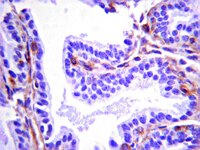05-1413 Sigma-AldrichAnti-CD45RA Antibody, Clone MEM 56
Anti-CD45RA Antibody, Clone MEM 56 detects level of CD45RA & has been published & validated for use in FC, IF, IH(P), IP & WB.
More>> Anti-CD45RA Antibody, Clone MEM 56 detects level of CD45RA & has been published & validated for use in FC, IF, IH(P), IP & WB. Less<<Recommended Products
Overview
| Replacement Information |
|---|
Key Spec Table
| Species Reactivity | Key Applications | Host | Format | Antibody Type |
|---|---|---|---|---|
| H, M, R | FC, IF, IH(P), IP, WB | M | Purified | Monoclonal Antibody |
| References |
|---|
| Product Information | |
|---|---|
| Format | Purified |
| Control |
|
| Presentation | Purified mouse monoclonal IgG2b in phosphate buffered saline containing 10 mM sodium azide and 1 mg/mL bovine serum albumin. We recommend that each laboratory determine an optimum working titre for use in its particular application. |
| Quality Level | MQ100 |
| Physicochemical Information |
|---|
| Dimensions |
|---|
| Materials Information |
|---|
| Toxicological Information |
|---|
| Safety Information according to GHS |
|---|
| Safety Information |
|---|
| Packaging Information | |
|---|---|
| Material Size | 100 µg |
| Transport Information |
|---|
| Supplemental Information |
|---|
| Specifications |
|---|
| Global Trade Item Number | |
|---|---|
| Catalogue Number | GTIN |
| 05-1413 | 04053252270802 |
Documentation
Anti-CD45RA Antibody, Clone MEM 56 SDS
| Title |
|---|
Anti-CD45RA Antibody, Clone MEM 56 Certificates of Analysis
| Title | Lot Number |
|---|---|
| Anti-CD45RA, Clone MEM 56 - NG1576287 | NG1576287 |
| Anti-CD45RA, Clone MEM 56 - NG1631264 | NG1631264 |
| Anti-CD45RA, clone MEM 56 - 2192169 | 2192169 |
| Anti-CD45RA, clone MEM 56 - 2227163 | 2227163 |
| Anti-CD45RA, clone MEM 56 - 2326997 | 2326997 |
| Anti-CD45RA, clone MEM 56 - 2495669 | 2495669 |
| Anti-CD45RA, clone MEM 56 - 3587166 | 3587166 |
| Anti-CD45RA, clone MEM 56 - 3770293 | 3770293 |
| Anti-CD45RA, clone MEM 56 - 3862547 | 3862547 |
| Anti-CD45RA, clone MEM 56 - NG1853758 | NG1853758 |











